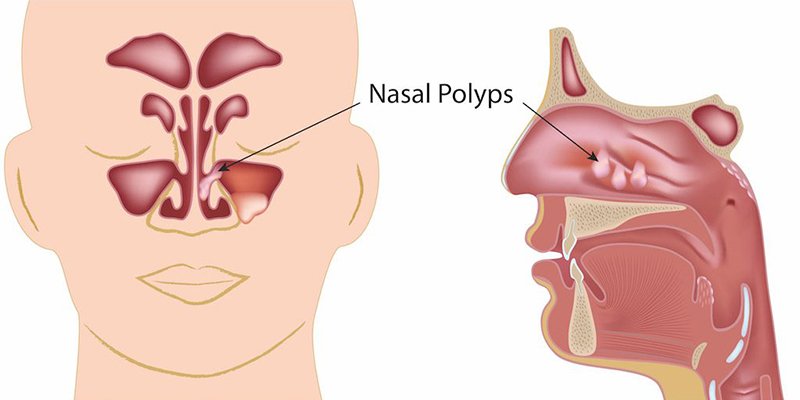Health & medical treatment
How To Get Rid Of Nasal Polyps Naturally?
Nasal polyps are soft, noncancerous growths that develop in the lining of the nasal passages or sinuses, often resulting from chronic inflammation. Common symptoms include nasal congestion, reduced sense of smell, sinus pressure, and frequent infections, which can significantly impact quality of life. As many individuals seek relief from these burdensome symptoms, the exploration of natural remedies presents a compelling alternative to traditional treatments. This article outlines effective natural strategies for managing nasal polyps, including dietary adjustments, herbal solutions, and lifestyle changes that can promote healing and enhance overall wellness.
Nasal polyps are soft, noncancerous growths that develop in the nasal passages or sinus lining, often resulting from chronic inflammation. Common symptoms include nasal congestion, reduced sense of smell, sinus pressure, and frequent infections, which can significantly impact quality of life. As many individuals seek relief from these burdensome symptoms, exploring natural remedies presents a compelling alternative to traditional treatments. This article outlines effective natural strategies for managing nasal polyps, including dietary adjustments, herbal solutions, and lifestyle changes that can promote healing and enhance overall wellness.

Nasal Polyps: Causes, Symptoms, and Impacts
Nasal polyps are benign growths within the nasal passages or sinuses due to inflammation in these areas. These soft, painless lumps can vary in size and shape, often resembling grapes or teardrops. If left untreated, they can lead to increased complications. While the exact causes of nasal polyps are not fully understood, several risk factors contribute to their formation. Allergies are significant triggers, particularly substances like pollen, dust mites, and pet dander. Moreover, individuals with asthma, chronic sinus infections, or sensitivities to certain medications are at a greater risk of developing polyps.
Typical symptoms include nasal congestion, difficulty breathing, and a diminished sense of smell or taste. These factors can heavily impact an individual's daily life, leading to challenges like frequent mouth breathing, sleep disturbances, and overall reduced quality of life. Understanding nasal polyps and their implications is fundamental for those affected, as it lays the groundwork for exploring effective natural remedies to manage this condition.
The Case for Natural Remedies
Nasal polyps are often treated with traditional medications such as corticosteroids, which can provide temporary relief. However, these treatments have various limitations and potential side effects, including mood changes, weight gain, and increased susceptibility to infections. Therefore, many individuals are prompted to explore natural remedies that aim to alleviate symptoms without the risk of adverse effects. Natural therapies, including saline sprays, steam inhalation, and herbal supplements, can help reduce inflammation and promote healing gently.
Furthermore, integrating these natural remedies with conventional treatments can significantly enhance their effectiveness. By harnessing the power of nature, individuals may find reduced reliance on medications while achieving prolonged relief from nasal polyps. This holistic strategy emphasizes a balanced approach to health, empowering individuals to manage their conditions without compromising their overall well-being.
Natural Remedies for Nasal Polyps
1. Dietary Changes
Nutrition is crucial in managing inflammation and promoting healing for nasal polyps. Incorporating anti-inflammatory foods into your diet can help reduce the size of polyps and alleviate symptoms. Focus on fruits and vegetables, which are abundant in vitamins, antioxidants, and minerals crucial for promoting health. Additionally, consuming foods high in healthy fats, such as avocados and oily fish, can bolster immune health. Conversely, limiting or avoiding products that may exacerbate inflammation, such as dairy, processed foods, and those rich in sugars, is advisable. By choosing a balanced diet primarily made up of whole foods, individuals can significantly impact their management of nasal polyps effectively.

2. Steam Inhalation
Steam inhalation is an effective technique for relieving nasal congestion and irritation associated with nasal polyps. The warmth of steam assists in loosening mucus and calming inflamed nasal passages. Here's a straightforward guide to performing steam inhalation at home:
1. Boil water in a pot and allow it to cool slightly before removing it from the heat.3. Essential Oils
Essential oils such as eucalyptus and tea tree oil are well-regarded for their anti-inflammatory and antimicrobial properties, making them beneficial in managing nasal polyps. To use these oils safely, dilute a few drops in a carrier oil like coconut oil before application. They can also be inhaled during steam inhalations or through a diffuser. Always conduct a patch test before applying oils directly to your skin, and consult with a healthcare professional if you have existing health concerns.
4. Saline Nasal Rinses
Saline nasal rinses are essential in maintaining nasal hygiene and can significantly alleviate nasal polyp symptoms by flushing out irritants and excess mucus. To prepare a saline rinse, mix one teaspoon of salt with two cups of warm distilled water. Use a neti pot or a squeeze bottle to administer the rinse. It's best to use the saline rinse once or twice daily for adequate symptom relief.
5. Home Remedies
Additional beneficial home remedies, such as turmeric and ginger, possess potent anti-inflammatory properties, aiding in managing nasal polyps. Incorporate turmeric into your cooking or consume it in warm milk, and add ginger to tea or meals for its extensive health benefits. Regularly including these ingredients in your diet can significantly help reduce inflammation and enhance overall health.
Lifestyle Changes to Prevent Recurrence
Minimizing allergens in your living environment is pivotal in managing nasal polyps and improving respiratory health. Common triggers such as dust and pet dander can worsen symptoms; hence, implementing effective strategies is essential.
One practical approach is maintaining a regular cleaning schedule, concentrating on dusting surfaces and vacuuming with a HEPA filter, which effectively traps allergens. Moreover, air purifiers can drastically enhance indoor air quality by filtering out harmful particles, making your home safer for your respiratory system.
Adopting a healthier lifestyle can further decrease allergen exposure. Incorporate whole foods into your diet, stay adequately hydrated, and exercise regularly to boost your body's natural defences. By implementing these approaches, you can create a more allergen-free living space and diminish the recurrence of nasal polyps.
When to Seek Medical Advice
It is vital to consult a healthcare professional if your nasal polyp symptoms continue or worsen despite using natural remedies. Indicators that necessitate a doctor's attention include severe facial pain, significant breathing difficulties, changes in vision, or an intense, foul-smelling nasal discharge. Furthermore, seeking medical attention is paramount if you experience a sudden onset of symptoms or any signs indicating infection, such as fever. Remember, early intervention can prevent complications and efficiently address your health concerns.
Take Charge of Your Health
In closing, managing nasal polyps naturally involves a blend of effective strategies, such as steam inhalation, dietary changes, and essential oils. These remedies aim to alleviate symptoms and promote overall health and wellness. Readers can take proactive steps to improve their condition by considering these natural alternatives. We encourage you to share your insights or experiences with these or other natural remedies in the comments below—your contributions could be invaluable to others seeking relief from nasal polyps! Together, let's navigate these holistic solutions towards a healthier future.



